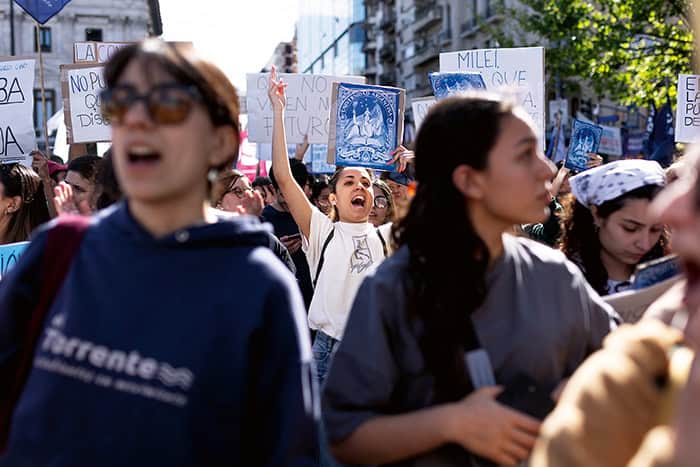”Scientists and intellectuals … if they think they are so useful, let them go out into the market and sell their studies, just like everyone else.”So said Argentina’s ultra-liberal president, Javier Milei, at an international conference in September.
He singled out academics as part of what he calls ”the caste”, a vaguely defined collection of enemies which includes politicians and other supposedly privileged groups under the previous system.
“If things continue like this, it will mean the end of the public education system,” says Alejandra Valverde, a teacher of environmental science at the University of Lujan and a member of the board of the local trade union association.
Behind the department’s banner, her group advances slowly towards the parliament building to join the anti-austerity protest, estimated to number a million people across the country. She almost has to yell to be heard above the drums and chanting.
Many of the protesters are carrying handwritten signs saying things like ‘First student in my family ever, thank you public university’.
“The department has stopped approving new research projects, eliminated most field studies and dismissed teachers, and the budget still doesn’t add up,” she says.
In April, the University of Buenos Aires was forced to temporarily turn off the hot water and air conditioning and turn off the lights in many parts of the university.
Universities have lost a third of their funding compared with a year ago – and the 2025 budget looks set to provide even less. According to the research foundation Centro de Economía Política Argentina, public sector employees have had the worst salary development in the country, and university teachers are below the average level even among that group.
“I have a master’s degree, and today I earn 330,000 pesos a month, (just under SEK 3,000, editor’s note). A typical salary for my colleagues is 200,000 pesos. Our salaries have lost 30 per cent of their value in a year. Just to get back to the level we were at when our salaries were at their highest in relative terms, in 2015, they would need to almost double.”
A law that would help to review funding levels has passed both houses of parliament, (where Milei’s ultra-liberal party colleagues do not have their own majority), but a few hours after the protesters went home, the Government Offices officially announced that the president would veto it.
Lucas Kreiman has a doctorate in biology. As part of its cost-cutting efforts, his department has recently started washing cotton that has been used in experiments instead of throwing it away.
“It will be a tough blow if the veto is upheld,” he says. “Maybe not quite a death sentence, but close. This is a government that is ideologically anti-science. At the same time, the statement sounded like the decision is not something they are really proud of. They are looking for excuses, like claiming that universities are corrupt. They understand that the majority of people do not support this.”

















